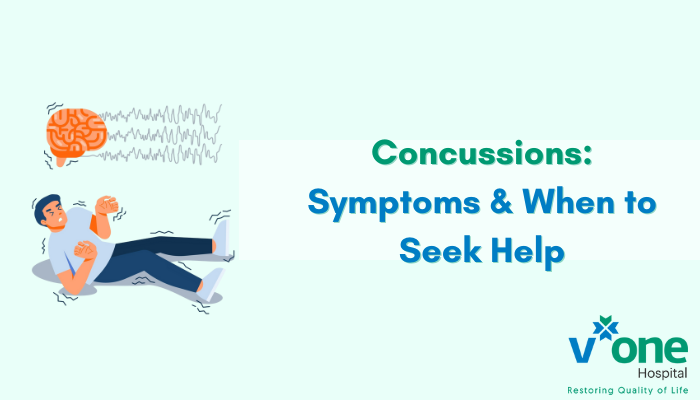Understanding Concussions: Symptoms and When to Seek Help
In our day-to-day lives, accidents can happen. Whether it’s from a fall, a car accident, or while playing sports, hitting your head can sometimes lead to something more serious—a concussion. A concussion is a type of brain injury, and even though it’s considered mild compared to other brain injuries, it should never be ignored.
In this blog, we’ll help you understand what a concussion is, how to recognize the symptoms, and when it’s time to seek medical help.
What is a Concussion?
A concussion is a mild traumatic brain injury (TBI) that happens when the brain moves rapidly inside the skull after a bump, blow, or jolt to the head. This sudden movement can affect how the brain functions—temporarily or even for a longer duration if not managed well.
While a concussion usually doesn’t cause lasting damage, it can lead to serious complications if not treated correctly. That’s why awareness and early care are key.
Common Causes of Concussions
Concussions can occur in many ways, including:
-
Sports injuries (especially in contact sports like football, hockey, or boxing)
-
Falls (common in children and older adults)
-
Car or bike accidents
-
Physical fights or domestic violence
-
Workplace accidents
You don’t necessarily have to lose consciousness to have a concussion. In fact, most people with concussions remain awake.
Signs and Symptoms of a Concussion
Symptoms of a concussion may appear right away or hours—even days—after the injury. These symptoms can vary from person to person, and they may affect how you think, feel, or act.
Here are the most common symptoms to watch for:
1. Physical Symptoms
-
Headache or pressure in the head
-
Nausea or vomiting
-
Dizziness or balance problems
-
Sensitivity to light or noise
-
Blurred or double vision
-
Feeling tired or having no energy
2. Cognitive Symptoms
-
Feeling confused or “foggy”
-
Difficulty concentrating
-
Trouble remembering things
-
Slowed thinking or response
3. Emotional Symptoms
-
Mood swings
-
Anxiety or nervousness
-
Feeling more emotional than usual
-
Irritability
4. Sleep-Related Symptoms
-
Sleeping more or less than usual
-
Trouble falling asleep
-
Feeling drowsy during the day
Children may show different signs like excessive crying, loss of interest in favorite activities, or changes in eating/sleeping patterns. If your child has hit their head and is acting differently, it’s best to get them checked.
When Should You Seek Medical Help?
It’s always better to be cautious when it comes to brain injuries. You should see a doctor immediately if:
-
The symptoms are getting worse
-
There is vomiting more than once
-
You experience seizures
-
You lose consciousness, even for a few seconds
-
There’s bleeding from the ear or nose
-
You have trouble walking or talking
-
There’s clear fluid draining from the nose or ears
-
You’re having trouble waking up or staying awake
In some cases, a concussion may seem mild at first but worsen over time. If anything doesn’t feel right, trust your instincts and consult a neurologist or visit an emergency facility.
How Are Concussions Diagnosed?
Your doctor will ask about your injury, symptoms, and medical history. They may also do a physical exam and test your memory, concentration, and balance. Imaging tests like a CT scan or MRI are sometimes used to rule out bleeding or more severe injuries, but are not always necessary for a basic concussion.
Treatment and Recovery
There is no single treatment for a concussion, but rest and care play a major role in recovery.
Key Recovery Steps
-
Physical Rest: Avoid heavy physical activities or sports until cleared by a doctor.
-
Mental Rest: Limit screen time, reading, or anything that puts pressure on the brain.
-
Sleep Well: Adequate sleep is crucial for healing.
-
Avoid Alcohol or Drugs: These can slow down the healing process and make symptoms worse.
-
Follow-up Appointments: Always attend follow-up visits to ensure your brain is healing properly.
Most people recover within a few days to a couple of weeks. However, some may experience post-concussion syndrome, where symptoms last for weeks or months. This condition needs medical guidance.
Can You Prevent Concussions?
Not all concussions can be prevented, but you can take steps to reduce your risk:
-
Wear helmets when biking, playing contact sports, or riding motorcycles.
-
Use seat belts while driving or riding in a car.
-
Prevent falls by keeping living spaces well-lit and clutter-free—especially for older adults.
-
Practice safe sports techniques and always follow rules and use protective gear.
Educating children, athletes, and caregivers about concussion risks can also help in early detection and proper care.
Why Early Attention Matters?
Ignoring a concussion can lead to complications like:
-
Long-term memory issues
-
Difficulty concentrating
-
Mood changes or depression
-
Second impact syndrome (a rare but dangerous condition if you get another head injury before the first one heals)
That’s why it’s essential to listen to your body and not rush back into regular activities—especially sports.
When to See a Specialist?
If your symptoms aren’t improving, or you’ve had multiple concussions in the past, it’s wise to consult a neurologist in Indore. They can evaluate your condition more deeply and create a plan tailored to your recovery.
Final Thoughts
Concussions might be labeled “mild,” but their effects can be anything but. Understanding the signs, knowing when to seek help, and taking the right recovery steps can make all the difference in how your brain heals.
If you or a loved one has suffered a head injury and is feeling “off,” don’t wait. Speak to a medical professional at a trauma centre in indore and get the care you need. Your brain deserves the best protection and attention.

